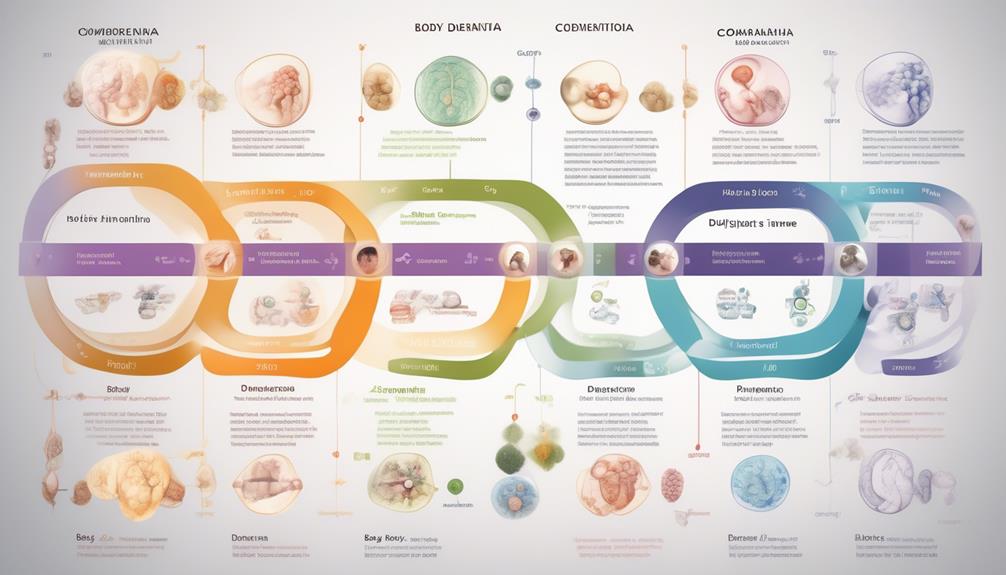Does Lewy Body Dementia fall under the category of terminal illness?
The answer to this query involves a nuanced understanding of the disease's progression and the impact it has on individuals. While the implications can be concerning, there are factors to consider that shed light on the topic.
This discussion will explore the various facets that contribute to the prognosis of Lewy Body Dementia and provide insights into the complexities surrounding its potential outcomes.
Key Takeaways
- Average life expectancy of 5 to 8 years post-diagnosis.
- Disease progression through seven stages impacting survival.
- End-of-life care crucial for respecting preferences and needs.
- Factors like falls or pneumonia can accelerate progression and be fatal.
Understanding Lewy Body Dementia Prognosis
When considering the prognosis of Lewy Body Dementia, it's vital to understand that it's a progressive and ultimately fatal neurodegenerative disease. Individuals diagnosed with Lewy Body Dementia typically face an average life expectancy of 5 to 8 years, although this can vary depending on factors such as age, overall health, and the presence of complications like falls or pneumonia, which can lead to fatalities. In the United Kingdom, individuals with this condition generally live between 6 to 12 years post-diagnosis. The disease typically progresses through seven stages, with stage seven lasting 1.5 to 2.5 years before death occurs.
As Lewy bodies accumulate in the brain, causing disruptions in cognitive function and motor control, individuals may experience fluctuations in their symptoms, including hallucinations, sleep disturbances, and movement problems. Understanding the stages and the potential complications that may arise along the way is crucial for caregivers and healthcare professionals to provide appropriate support and care for those affected by Lewy Body Dementia.
Factors Influencing Disease Progression

Factors influencing the progression of Lewy Body Dementia include the severity of symptoms, the age of the individual, and their overall health status. The severity of symptoms plays a crucial role in determining the pace at which the disease advances. Individuals experiencing more intense symptoms may see a faster progression of the condition.
Age is another significant factor, with older individuals often experiencing a more rapid decline in cognitive and physical abilities. Additionally, the overall health status of the individual can impact how the disease progresses. Those with underlying health issues may face complications that accelerate the advancement of Lewy Body Dementia.
Understanding these factors is important in predicting the course of the illness and providing appropriate care and support. It's essential to consider these aspects when discussing the prognosis and potential outcomes for individuals diagnosed with Lewy Body Dementia.
Treatment Options for Managing Symptoms
Understanding the importance of addressing specific symptoms in Lewy Body Dementia, treatment options focus on utilizing medications, lifestyle interventions, and therapies to effectively manage cognitive and movement challenges associated with the condition.
- Medications: Cholinesterase inhibitors and carbidopa-levodopa can help manage cognitive and movement symptoms, such as confusion and movement problems.
- Lifestyle Interventions: A healthy diet, regular exercise, and engaging in social activities are crucial for managing symptoms like disturbed sleep and hallucinations.
- Therapies: Occupational therapy and physical therapy play a significant role in maintaining abilities and enhancing the quality of life for individuals with Lewy Body Dementia.
- Support Groups: Caregivers and family members can benefit from support groups, which provide valuable assistance and emotional support while managing symptoms of Lewy Body Dementia.
These comprehensive approaches aim to improve the overall well-being of individuals with Lewy Body Dementia and enhance their quality of life.
Impact on Life Expectancy

The life expectancy of individuals diagnosed with Lewy body dementia typically ranges from 5 to 8 years post-diagnosis, with variations based on symptom severity, age, and overall health. The progression of Lewy body dementia can impact life expectancy significantly.
In the UK, individuals with this condition live on average 6 to 12 years after diagnosis. Stage seven of Lewy body dementia, characterized by severe cognitive decline and the need for round-the-clock care, typically lasts 1.5 to 2.5 years before death.
Complications such as falls or pneumonia can lead to fatalities in individuals with Lewy body dementia, further affecting their life expectancy. It's essential to consider these factors when discussing the impact of this condition on longevity.
Understanding the average life expectancy and the potential complications that can arise at different stages of the disease can help individuals and their families make informed decisions regarding their care and future planning. Additionally, this knowledge allows families to be better prepared for the progression of the disease, both emotionally and financially. Discussions about advanced directives, including a living will explained in detail, ensure that the patient’s preferences are clearly understood and respected. By addressing these considerations early, individuals can ensure their wishes are honored, potentially reducing stress for both themselves and their loved ones during difficult times.
Addressing End-of-Life Care
To ensure appropriate end-of-life care for individuals with Dementia with Lewy Bodies (DLB), advance care planning plays a crucial role in respecting their wishes and preferences. When addressing end-of-life care for DLB patients, several key factors should be considered:
- Advance Care Planning: Engage in discussions early on to understand and document the individual's wishes regarding their care preferences.
- Improved Physician Communication: Enhance communication between physicians and families to ensure that end-of-life decisions align with the patient's desires.
- Failure to Thrive Awareness: Recognize that failure to thrive is a common cause of death in DLB patients, impacting their end-of-life experiences.
- Tailored Care and Physician Recognition: Tailor end-of-life care plans to the specific needs of DLB patients, and increase physician recognition of the challenges in clinician-family communication to provide comprehensive support.
Frequently Asked Questions
How Long Do People With Lewy Body Dementia Live?
We'll start by addressing how long individuals with Lewy Body Dementia live. Life expectancy for those with this condition varies, with an average of 5 to 8 years post-diagnosis. However, this range can be broad, spanning from 2 to 20 years.
In the UK, the typical lifespan after diagnosis is around 6 to 12 years. The final stage of the disease, stage seven, generally lasts 1.5 to 2.5 years before death occurs.
What Are the 7 Stages of Lewy Body Dementia?
In understanding Lewy Body Dementia, one must navigate through its seven stages, from subtle indicators in stage one to profound cognitive and physical limitations in stage five. These stages offer insight into the evolving challenges individuals face as the condition progresses.
Hallucinations, delusions, and cognitive decline are prominent features in later stages, shaping the quality of life for those affected.
The journey through these stages is a poignant exploration of the human experience.
What Causes Death in Lewy Body Dementia?
In Lewy Body Dementia, complications like falls or pneumonia can lead to fatalities due to the progressive decline in cognitive and physical functions. The disease shortens lifespan, with an average of 5 to 8 years post-diagnosis.
End-stage Lewy Body Dementia is particularly critical, as it can result in death as a consequence of the overall deterioration in health. Understanding these factors is crucial in managing and providing care for individuals with this condition.
Is Lewy Body the Worst Dementia?
Lewy Body Dementia is challenging due to its progressive nature and complex symptoms. It ranks as one of the most difficult forms of dementia, affecting many individuals.
The disease presents cognitive decline, movement issues, hallucinations, and behavior changes, impacting quality of life.
Its fatality stems from complications like falls or pneumonia, with varying life expectancies post-diagnosis.
These factors contribute to the significant impact Lewy Body Dementia has on those affected.
Conclusion
In conclusion, managing Lewy Body Dementia is crucial for individuals and their families. With proper treatment and care, we can improve quality of life and potentially extend life expectancy.
But, as we navigate this challenging journey, we must ask ourselves: Can we provide the support and compassion needed to ensure comfort and dignity in the final stages of this devastating disease?









